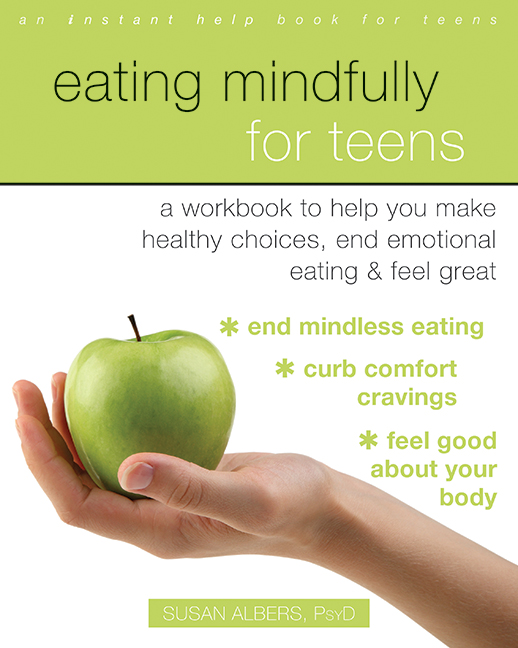By Susan Albers, PsyD, author of Eating Mindfully for Teens
Does your teen love to watch their favorite Netflix TV show series for hours on end? They sit down on the couch and half the day passes by before they know it. Perhaps you discover your teen up at 2:00 am still up watching TV. He or she promises to go to bed when they finish just one more episode. Up to 60% of people who watch streamed TV admit to binge watching their favorite TV show. While it’s common to love on-demand shows and quite normal at this point in our culture, there are some hidden downsides to binge watching shows to your health, particularly for teens.
Studies have shown that binge watching TV leads to a significant increase of binge eating. Teens tend to eat an average of three additional unhealthy snacks a day due to high levels of screen time. Also, staying up past their bed time leads to changes in their sleep hormones, which increases teens’ appetites. The good news is that helping your child to be more mindful of their binge watching can have a significant impact on improving their eating habits. Here are some tips that will help you set healthy snacking habits:
1. Set limits on episodes.
Help your child set some limits such as the number of episodes and time they watch in a day. Talk together about reasonable expectations. Parents can double check the account online to make sure they stick to these limits.
2. Don’t let binge marathon munching impact their sleep.
Help your teen to go to bed at a reasonable time. Set their cell phone timer, or yours, to alert them when it’s bedtime. Even missing one hour of sleep impacts their appetite hormones and makes them hungrier in the morning. Teens tend to make the worst food decisions when tired—reaching for sugar for energy.
3. Suggest that your teen watch with a buddy.
This will help to keep them honest about their watching time. They don’t want to jump ahead of their friend. Another benefit is that people tend to eat more mindfully when they have an audience rather than when they are at home eating alone.
4. Don’t eat and watch TV at the same time.
Suggest that your teen put the TV on pause if they have a snack or move to a table. They can turn it right back on afterwards.
5. Set healthier portions.
If your teens does eat a snack while watching TV, help them to portion it out—remind them not to eat right out of the bag or box.
 Susan Albers, PsyD, is a New York Times bestselling author and licensed clinical psychologist at the Cleveland Clinic specializing in eating issues, weight loss, body image concerns, and mindfulness. She graduated from the University of Denver, completed an internship at the University of Notre Dame, and was a postdoctoral fellow at Stanford University. Her work has been quoted in O, The Oprah Magazine; Family Circle; Self; and The Wall Street Journal, and she conducts mindful eating workshops internationally. She was a guest expert on TheToday Show and The Dr. Oz Show.
Susan Albers, PsyD, is a New York Times bestselling author and licensed clinical psychologist at the Cleveland Clinic specializing in eating issues, weight loss, body image concerns, and mindfulness. She graduated from the University of Denver, completed an internship at the University of Notre Dame, and was a postdoctoral fellow at Stanford University. Her work has been quoted in O, The Oprah Magazine; Family Circle; Self; and The Wall Street Journal, and she conducts mindful eating workshops internationally. She was a guest expert on TheToday Show and The Dr. Oz Show.


 Why Journaling Is Especially Helpful to Adult Children of Emotionally Immature Parents
Why Journaling Is Especially Helpful to Adult Children of Emotionally Immature Parents